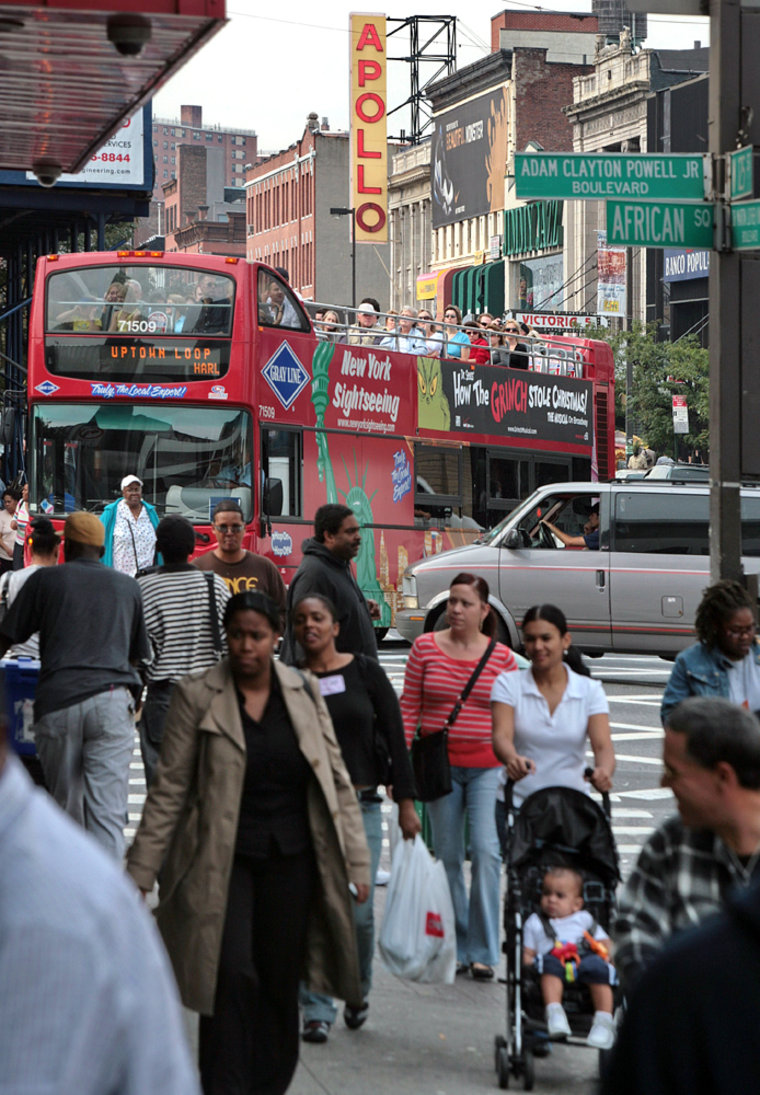Harlem’s heart still beats strong on 125th Street, a lively thoroughfare where remnants of the neighborhood’s legendary past sit side-by-side with newly arrived banks and chain stores.
But as new development sprouts among the soul food restaurants, funky record stores and such landmarks as the Apollo Theater, Harlem’s main street — named one of the nation’s 10 greatest last year — is struggling to retain the character residents have cherished for decades.
On Monday, city officials are scheduled to vote on a massive rezoning plan for the corridor. The proposal would create condominiums, more performing arts space, hotels and a 21-story office tower with such high-profile tenants as Major League Baseball.
‘It will be a disaster’
Officials say the changes will revive a cultural identity that had been threatened by unregulated development. But many longtime residents fear a rezoned 125th Street will price them out of their homes and erode even more of their community.
“It will be a disaster,” said Sikhulu Shange, the owner of a 125th Street record store for more than three decades.
“People come to Harlem, they don’t come to see a McDonald’s. They don’t come to see a Burger King,” he said. “They want to come to places like The Record Shack, like Sylvia’s (the famed soul food restaurant), where they can come down and feel the atmosphere of Harlem. All these things, they are in danger.”
Many business leaders disagree with Shange’s take on the zoning proposal, which has been in the works for four years and would cover dozens of blocks.
The largest arts groups in the corridor have supported it. Jonelle Procope, president and CEO of the Apollo Theater Foundation, said the rezoning “demonstrates a true understanding of Harlem, where culture is not simply important, but fundamentally woven into the fabric of community.”
The plan offers developers incentives to create performing arts space by allowing them to build three square feet of space for every one square foot for the arts, said Planning Department spokeswoman Rachaele Raynoff.
“We wanted to respect the heritage and respect the great heyday of the arts,” Raynoff said. “People used to come here to be entertained. We’re trying to have more Apollos.”
Concerns about height
City Council Member Inez Dickens, who represents central Harlem, has also largely supported the plan, which would require the council’s approval. Dickens has said fears that rezoning would create a high-rise district are unfounded. The plan, he noted, actually sets height limits for development that don’t exist now.
“If you had the resources and you could get a shovel into the ground before this rezoning, no one could stop you from building something so out of context, so out of character with the rest of the streetscape, you could pierce the very fabric of this village of Harlem,” Dickens said at a public hearing.
City planners will propose one exception to the height restriction: Harlem Park, the first large office tower to be built in Harlem in decades. Major League Baseball is a likely tenant and the city has offered millions in other economic incentives.
‘A village character’
Height is a main concern for Franc Perry, chairman of a Harlem community board. The neighborhood is one of the last business districts in New York to allow pedestrians unobstructed sky views, he said.
“It has a village character. You really do see people walking down the street saying hello to each other,” Perry said.
He said no building should rise higher “than the cap of the Hotel Theresa,” the landmark where Louis Armstrong, Lena Horne and Fidel Castro stayed and where Malcolm X held meetings of the Organization of Afro-American Unity after breaking from the Nation of Islam.
Perry and others also worry that allowing about 2,500 new apartments on the corridor would displace residents and threaten the street’s commercial feel. Raynoff said new residents would bring a customer base for the businesses.
Shange said denser development would dwarf his small storefront, where he has fought eviction for over a year. He said when he arrived in Harlem, his store selling Caribbean, African and gospel was one of 15 music stores.
“I’m the only one left now,” he said.
About 70 other small businesses with a history on the street feel similarly threatened, he said.
“The little bit we have, we are being dislocated. It doesn’t seem that there is anything we can do if they are successful,” Shange said. “The only thing which will help us is that this whole plan fails.”
